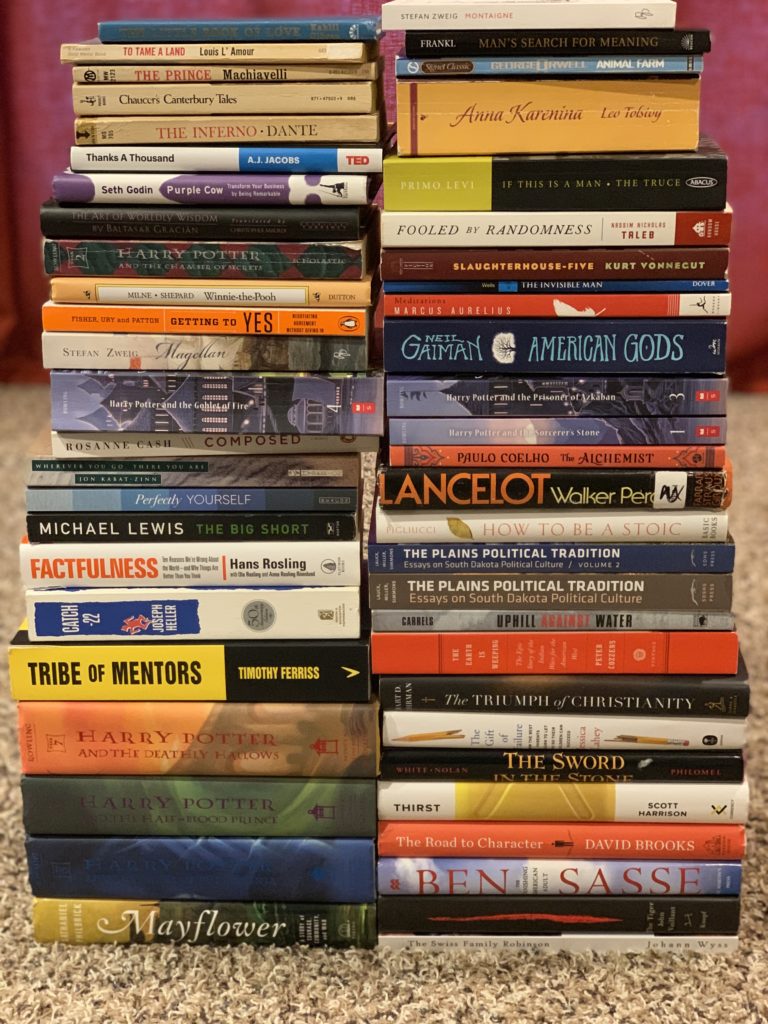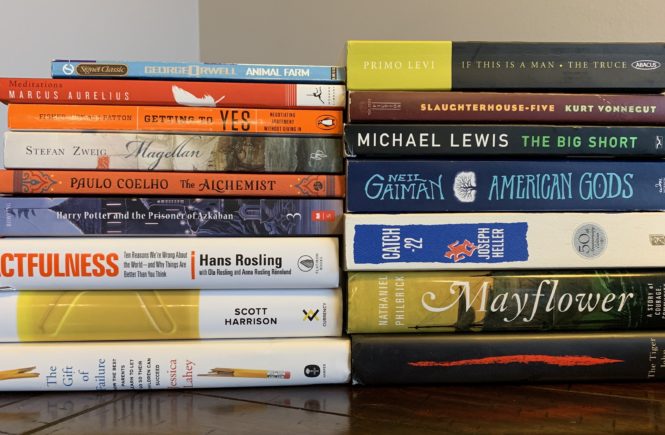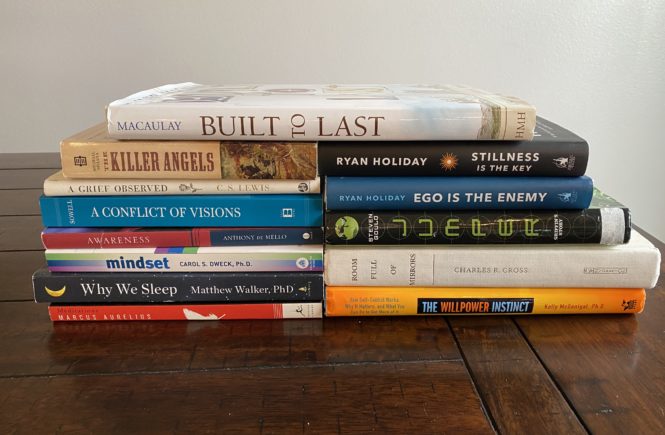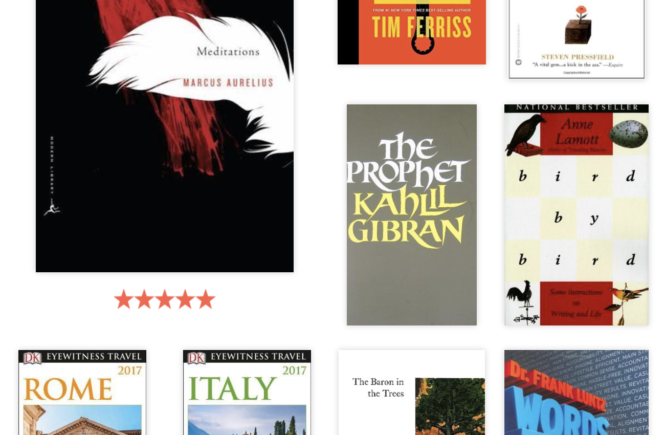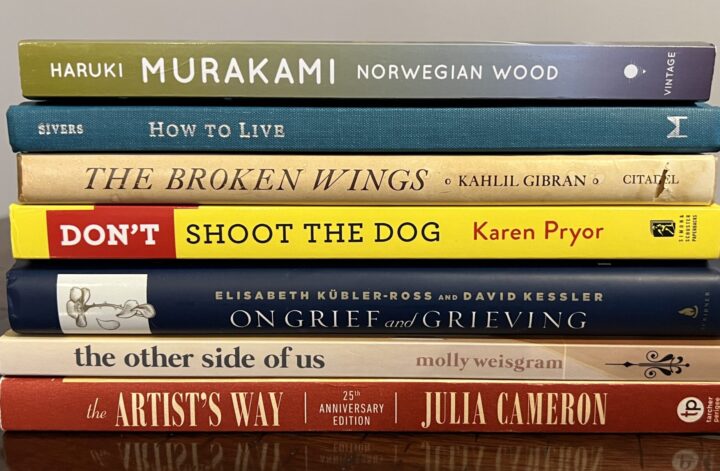This year I decided to read 52 books–a book a week. My original goal was two a month, but I was so far ahead by mid-February that I upped the ante. I also listened to another 10 books on Audible.
These were my favorites:
If This is a Man and The Truce by Primo Levi – Two true stories written by an Italian Jew deported to German concentration camps during WWII. The first details his unlikely survival, while the second follows his journey back to Italy. One of my favorite books of the year.
Favorite line: “For human nature is such that grief and pain—even simultaneously suffered—do not add up as a whole in our consciousness, but hide, the lesser behind the greater, according to a definite law of perspective.”
A Gentleman in Moscow by Amor Towles – This was the best book I read all year (although I listened to it). The book follows fictional aristocrat Count Rostov as he is sentenced to house arrest in the finest hotel in Moscow soon after the Russian Revolution. I plan to buy the book and actually read it in 2019.
The Tiger by John Vaillant – One of my favorites this year. It tells the true story of a tiger attack in Russian Manchuria, while intertwining lessons on the geography, demographics, history, psychology, etc. of every aspect of the story. You learn about far eastern Russia and its native people. You learn about perestroika, about communism, about Russia/China conflicts. You learn about tigers and how they are different as predators (including how they are the only animal that will hold a grudge like this and seek vengeance) and about how we have interacted with them for tens of thousands of years. Honorable mention here goes to Shadow Divers by Robert Kurson, which uses a similar style to tell about deep wreck diving and the discovery of a sunken German U-boat.
The Big Short by Michael Lewis – An inside look and engaging explanation of how investors shorting subprime mortgage bonds brought the world’s financial system to its knees in 2008. Recommended by my friend, Kevin Gunn. I plan to read more Michael Lewis in 2019.
Slaughterhouse-Five by Kurt Vonnegut – My first Vonnegut read. Absolutely hilarious. I will be reading more Vonnegut in 2019.
Favorite line: “Sooner or later I go to bed, and my wife asks me what time it is. She always has to know the time.”
The Alchemist by Paulo Coelho – The novel follows a young shepherd as he goes on a quest to discover his Personal Legend. The story is filled with poetic aphorisms and ideas around spirituality and fate. Quick and fun read.
Favorite line: “for her every day was the same, and when each day is the same as the next, it’s because people fail to realize the good things that happen in their lives every day that the sun rises.”
Catch-22 by Joseph Heller – A novel following Captain Yossarian and his deployment to Italy during WWII—and the catch that keeps him there. It’s like reading the WWII version of M*A*S*H.
Favorite line: “He was a long-limbed farmer, a God-fearing, freedom-loving, law-abiding rugged individualist who held that federal aid to anyone but farmers was creeping socialism. He advocated thrift and hard work and disapproved of loose women who turned him down.”
American Gods by Neil Gaiman – I’m a huge fan of Neil Gaiman, especially when he reads his own stories (I’ve listened to him read The Graveyard Book several times and also listened to Norse Mythology this year). This story is based on the premise that U.S. folklore was imported with its immigrant population and what happens as those imported cultures fade.
Favorite line: “the joy’s gone out of me now, like the pee from a small boy in a swimming pool on a hot day.”
Thirst by Scott Harrison – Written by the founder of charity: water, the first half of the book is a remarkable autobiography of personal transformation, while the second half details how the author created a charity that puts 100% of its donations to work and then stays accountable to donors. One of the reasons for the charity’s success is Scott’s storytelling skills, which make the book hard to put down.
Factfulness by Hans Rosling – Recommended by Edward Garvey, it provides a factual review of how good/bad the world is (“both bad and better”), regardless of how the media portrays it. If, like me, you’re a fan of Matt Ridley, you won’t be too surprised with the facts, but will still find it helps you think clearly about the current state of population, poverty, etc.
Favorite line: “When a problem seems urgent the first thing to do is not to cry wolf, but to organize the data.”
Animal Farm by George Orwell – Hilarious classic, originally targeted at Stalinist Russia, cautioning us about the dangers of nationalism and totalitarianism.
Getting to Yes by Fisher, Ury, & Patton – Describes what the authors call “principled negotiation” – negotiation based on a thorough review of the parties’ interests, meant to avoid the common negotiation gambits and maintain relationships.
Favorite line: “Be hard on the problem, soft on the people.”
Meditations by Marcus Aurelius (Gregory Hays Translation) – I read this every year, and I find new gems every year. One of my favorite lines from this year’s read: “It can ruin your life only if it ruins your character.”
Mayflower by Nathaniel Philbrick – Tells the story of the Separatists that were pushed out of England to Holland before going on to Plymouth as half of the Mayflower’s passengers. Goes on to detail the first 50 years after the Mayflower landed in 1620, ending with King Philip’s War. One major interest to me is the fact that I could trace some ancestors back to the area, if not the Mayflower itself.
Favorite line: “In 2002 it was estimated that there were approximately 35 million descendants of the Mayflower passengers in the United States, which represents roughly 10 percent of the total U.S. population.”
Magellan by Stefan Zweig – A succinct biography of Ferdinand Magellan. The book was hard to put down, as the story is as much of an adventure as any good fiction.
Favorite line: “What an amazing moment, one of the most remarkable in all of mankind! For the first time since our planet had begun to spin upon its axis and to circle in its orbit, a living man, himself circling that planet, had got back to his homeland. No matter that he was an underling, a slave, for his significance lies in his fate and not in his personality. He is known to us only by his slave name Enrique, but we know, likewise, that he was torn from his home upon the island of Sumatra, was bought by Magellan in Malacca, was taken by his master to India, to African and to Lisbon; travelled thence to Brazil and to Patagonia; and, first of all the population of the world, traversing the oceans, circling the globe, he returned to the region where men spoke a familiar tongue.”
The Gift of Failure by Jessica Lahey – Author’s parenting advice: step back from kids’ lives and allow them to fail so they learn to solve their own problems and develop independence and autonomy. The book certainly changed the way we have looked at parenting.
Harry Potter Series by J. K. Rowling – Yeah, everyone read these books for a reason, and they are much better than the movies. I read them all in about two months, adding a different book between each one. I couldn’t wait to read the next.
The Courage to be Disliked by Ichiro Kishimi – Translated from Japanese, the book is an introduction to Adlerian psychology, presented as a socratic dialogue. While difficult to agree with everything, it was intriguing and shares a lot of similarities with stoicism.
